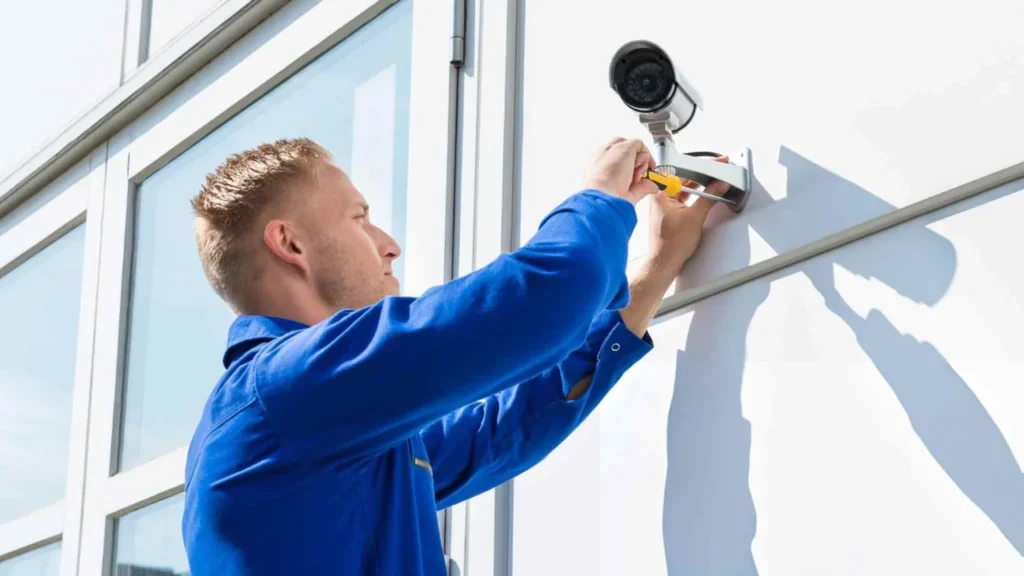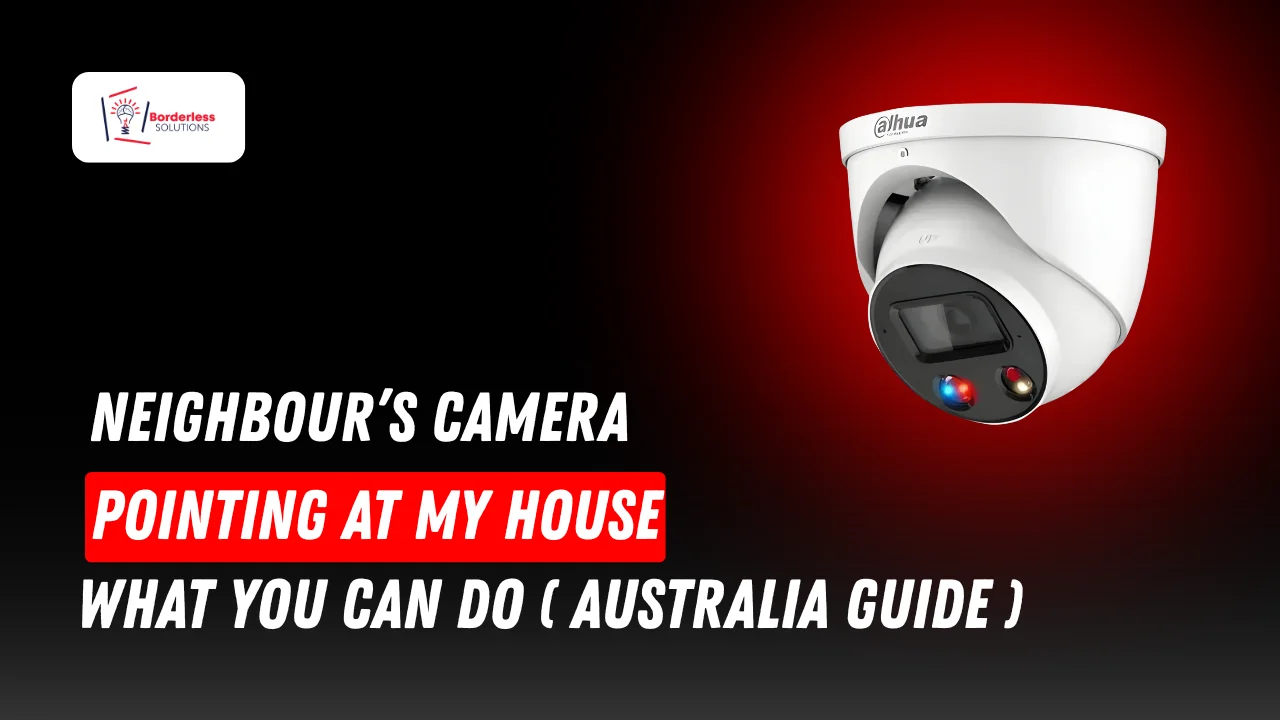As home security cameras become more common across Australia, privacy concerns between neighbours are on the rise. It’s not unusual to notice a camera that appears to be facing your yard, driveway, or windows and wonder if that is even allowed.
This article will explains to you what is legal and how to protect your privacy, and the best ways to handle the situation calmly and effectively.
Is It Legal for a Neighbour to Point a Camera at My House?

In most parts of Australia, there is no federal law that directly stops someone from installing a security camera on their own property even if it captures part of a neighbour’s home. However, every state and territory has its own surveillance laws that define when recording becomes illegal.
Generally:
-
It’s legal to record video in public areas (like streets or driveways).
-
It’s not legal to deliberately record private activities inside another person’s home or fenced yard where there’s a reasonable expectation of privacy.
-
Using cameras to harass, intimidate, or spy on neighbours may amount to a criminal offence or a civil nuisance.
State-by-State Snapshot
| State / Territory | Main Law | Key Point |
|---|---|---|
| NSW | Surveillance Devices Act 2007 | It’s an offence to record private activities without consent. |
| VIC | Surveillance Devices Act 1999 | You can’t use an optical device to observe private activity. |
| QLD | Invasion of Privacy Act 1971 | Recording private conversations without consent is illegal. |
| SA | Surveillance Devices Act 2016 | Prohibits installing devices to monitor private areas. |
| TAS | Listening Devices Act 1991 | Focuses on audio recording, but privacy laws also apply. |
| WA / NT / ACT | Similar laws | Each has local rules restricting private surveillance. |
If you’re unsure, check your state’s privacy or surveillance regulator website for the latest legislation.
What About Audio Recording?
Audio recording is far more restricted than video. Most home security systems now have microphones, but recording someone’s voice without permission is illegal in many Australian states.
For example:
-
In NSW, it’s an offence to record a private conversation without the consent of all parties.
-
In Victoria, you can record if you’re a party to the conversation but not if you’re secretly recording others.
If your neighbour’s camera captures both video and audio from your property, they may be breaching surveillance laws.
What Can I Do If My Neighbour’s Camera Faces My Property?
If you believe your neighbour’s camera is aimed at your home, it’s important to stay calm and handle it respectfully.
1. Start with a Conversation
The first step is always to talk. Calmly approach your neighbour and explain why you feel uncomfortable. Often, the camera angle only appears intrusive many people simply want to secure their driveway or front gate and don’t realise it’s bothering you.
2. Document What You See
If the camera truly seems aimed at your property, record evidence. Take clear photos or short videos showing where the camera points. Note specific times or days you feel observed this can be helpful if the matter escalates to mediation or a legal complaint.
3. Check Local Laws
Each Australian state and territory has its own surveillance and privacy rules. Your local council can clarify what’s allowed in residential zones or apartment blocks. Understanding these laws early can save you from unnecessary tension or misinformation.
4. Contact Police or a Legal Advisor
If your neighbour refuses to adjust the camera or you believe it’s used to invade privacy, contact your local police station or a community legal centre. They can explain whether the situation breaches state privacy or harassment laws and guide you on next steps.
5. Consider Mediation
Before resorting to legal action, try mediation. Community Justice Centres across Australia offer free services where both parties can discuss the issue with a neutral mediator. It’s often the quickest and most peaceful way to restore privacy and neighbourly respect.
How to Block or Deter a Neighbour’s Camera
There are several lawful and non confrontational ways to protect your privacy:
-
Install privacy screens, lattice fences, or tall plants to block the line of sight.
-
Use frosted glass, sheer curtains, or window film in sensitive rooms.
-
Consider infrared floodlights they can affect many cameras’ night vision without harming property.
-
Avoid pointing your own camera back at theirs this could escalate conflict or create legal issues.
When It Might Be a Legal Offence
Your neighbour may be committing an offence if they are:
-
Deliberately recording inside your bedroom, bathroom, or private yard.
-
Using cameras to harass or intimidate you.
-
Recording conversations without consent.
-
Engaging in ongoing surveillance that affects your ability to enjoy your property which could amount to private nuisance (as confirmed in Raciti v Hughes [1995]).
Handling It Peacefully
Before escalating the matter:
-
Send a polite written request or email asking them to adjust the camera angle.
-
Keep a copy of your message as proof of reasonable communication.
-
If they ignore your request, contact the local council or police for guidance.
-
Mediation or legal advice should always come before court action.
Protecting Your Own Security Legally
If you plan to install your own security cameras:
-
Point cameras only within your boundary or toward public areas.
-
Avoid recording your neighbour’s property or private spaces.
-
Turn off audio recording unless necessary.
-
Store your footage securely to prevent unauthorised access.
Hiring a licensed CCTV installer ensures your system complies with Australian privacy and surveillance laws.
Frequently Asked Questions
1. How can I stop my neighbour’s camera from pointing at my house?
Start by politely asking them to adjust it. If that fails, use privacy screens or plants, or contact your local council or legal service for advice.
2. Can neighbours have security cameras towards your house in Australia?
Yes, if it’s on their property and only captures public or shared areas. It becomes a problem if it records your private spaces or conversations.
3. How to block a neighbour’s security camera?
Use fences, screens, or outdoor plants to obstruct the camera’s view. Avoid shining lights or damaging the camera that could create legal issues.
4. What can I do if my neighbour is watching me?
If you believe they’re spying or harassing you, document the behaviour and report it to police. You may have a legal claim under surveillance or nuisance laws.
5. Are there laws against filming my backyard?
Yes filming inside a fenced or private area without consent may breach surveillance laws or amount to an invasion of privacy.
6. Who can I contact if my neighbour refuses to move the camera?
Contact your local council, community justice centre, or a lawyer specialising in privacy and surveillance. Police may also intervene if harassment is involved.
7. Is CCTV an invasion of privacy?
Not necessarily. CCTV becomes a privacy issue when it records private areas without consent. Each Australian state has laws governing how surveillance devices can be used.
Final Thoughts
Security cameras help keep our homes and families safe but privacy matters, too. If a neighbour’s camera feels intrusive, approach the issue calmly, document your concerns, and seek advice if needed. A friendly conversation often solves the problem, while knowing your rights ensures you’re protected under the law.
At Borderless Solutions, our licensed security technicians provide complete CCTV and camera installation services for homes, businesses, and schools. From correct camera placement to reliable system setup and footage management, we take care of everything, giving you a secure, and hassle free experience from start to finish.

